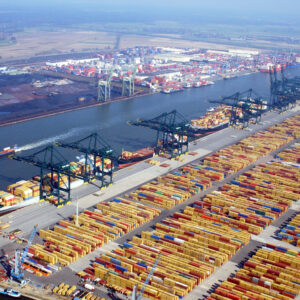
The operational capacity of Northern Europe’s logistics network is under significant pressure, with the Port of Antwerp at the centre of what officials are calling its most complex crisis since the COVID-19 pandemic. This update outlines the key factors contributing to the disruption and the potential implications for supply chains over the coming months.
Current Situation
- Port Congestion: Yard utilisation at the Port of Antwerp has reached 96%, with berth waiting times up by 37%. Similar congestion is being reported at other major ports including Rotterdam and Hamburg.
- Vessel Delays: Reports indicate that nearly half of all commercial vessels in the region are currently waiting to dock, creating a backlog that is affecting both imports and exports.
- Service Changes: Maersk has announced it will skip Rotterdam entirely on its TA5 transatlantic service starting 25 June, citing “operational constraints.” This reflects a broader trend of carriers adjusting schedules in response to regional bottlenecks.
Contributing Factors
- Systemic Congestion: The cumulative effect of high container volumes, limited terminal space, and overlapping service schedules is overwhelming port infrastructure.
- Inland Transport Disruptions:
- Rhine River: Critically low water levels are reducing barge capacity, limiting inland waterway transport.
- Rail: Ongoing rail strikes and maintenance work are further restricting inland freight movement.
- Alliance Restructuring: The formation of new shipping alliances, such as the Gemini Cooperation between Maersk and Hapag-Lloyd, is leading to fragmented vessel arrivals and increased pressure on terminal operations.
Outlook
Industry analysts suggest that these disruptions could persist through the summer peak season, with some forecasts extending into July or August 2025. The situation remains fluid, and further schedule changes or delays are likely.
Implications for Supply Chains
- Extended Transit Times: Clients should anticipate longer lead times for shipments moving through Northern European ports.
- Increased Costs: Congestion surcharges, demurrage, and detention fees may rise as delays continue.
- Reduced Schedule Reliability: Carriers are adjusting port calls and transit routes with limited notice, increasing the risk of missed connections and delivery delays.
Recommendations
Meachers Global Logistics advises clients to:
- Plan Ahead: Where possible, build additional lead time into supply chain planning.
- Stay Informed: Monitor carrier advisories and port updates regularly.
- Consider Alternatives: Evaluate routing options through less congested ports or via alternative transport modes.
We will continue to monitor the situation closely and provide updates as new information becomes available. For tailored advice or support with rerouting and contingency planning, please contact the Meachers team here.









